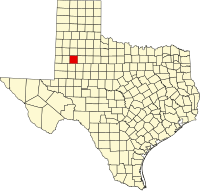Lynn County, Texas
| Lynn County, Texas | |
|---|---|

Lynn County Courthouse in Tahoka
|
|
 Location in the U.S. state of Texas |
|
 Texas's location in the U.S. |
|
| Founded | 1903 |
| Seat | Tahoka |
| Largest city | Tahoka |
| Area | |
| • Total | 893 sq mi (2,313 km2) |
| • Land | 892 sq mi (2,310 km2) |
| • Water | 1.6 sq mi (4 km2), 0.2% |
| Population | |
| • (2010) | 5,915 |
| • Density | 6.6/sq mi (3/km²) |
| Congressional district | 19th |
| Time zone | Central: UTC-6/-5 |
| Website | www |
Lynn County is a county in the U.S. state of Texas. As of the 2010 census, its population was 5,915. Its county seat is Tahoka. The county was created in 1876 and organized in 1903.
Lynn County, along with Crosby and Lubbock Counties, is part of the Lubbock Metropolitan Statistical Area (MSA). The Lubbock MSA and Levelland Micropolitan Statistical Area (µSA), encompassing only Hockley County, form the larger Lubbock–Levelland Combined Statistical Area (CSA).
Lynn County is one of thirty prohibition, or entirely dry, counties in the state of Texas.
The county has two historical museums, the O'Donnell Heritage Museum, with a Dan Blocker room in O'Donnell, and the Tahoka Pioneer Museum in Tahoka.
Apache and Comanche roamed the high plains until various military expeditions of the 19th Century pushed them away.
The Red River War of 1874 was a military campaign to drive out the Apache, Comanche and Kiowa in Texas. In 1877, the ill-fated Nolan Expedition crossed the county in search of livestock stolen by Comanche renegades. The various Indian tribes had moved on by the time of white settlement due to the depletion of the buffalo herds by hunters.
In the early 1880s sheep and cattle ranchers began to set up operations in the county. The situation changed as large-scale ranching spread into the county.
...
Wikipedia
